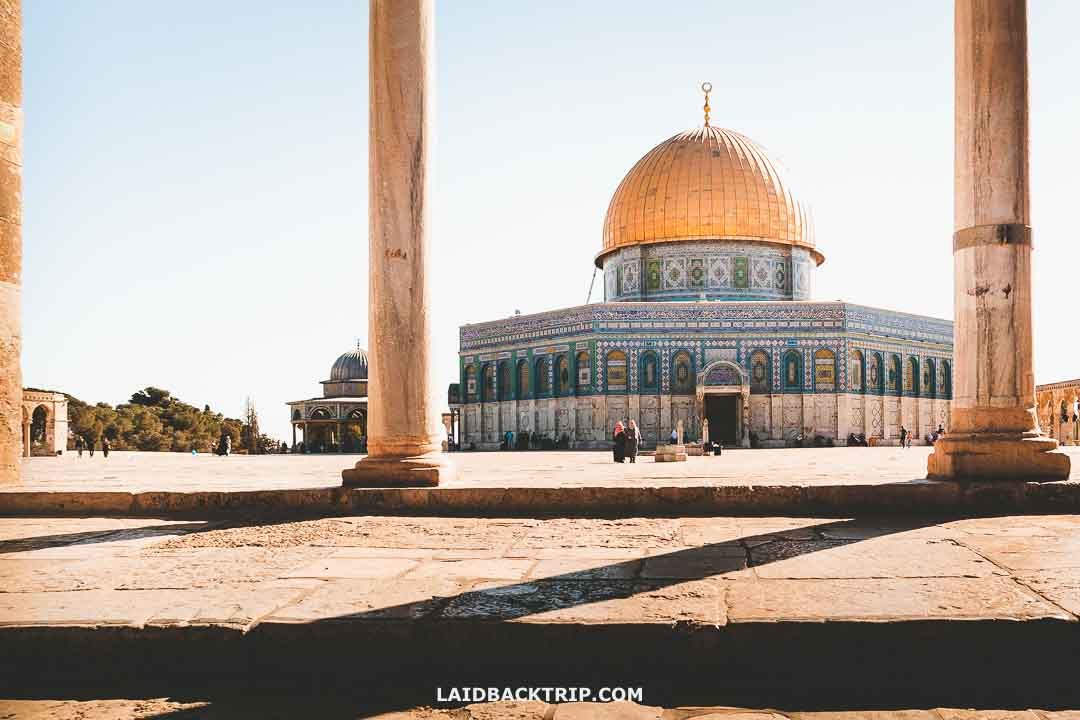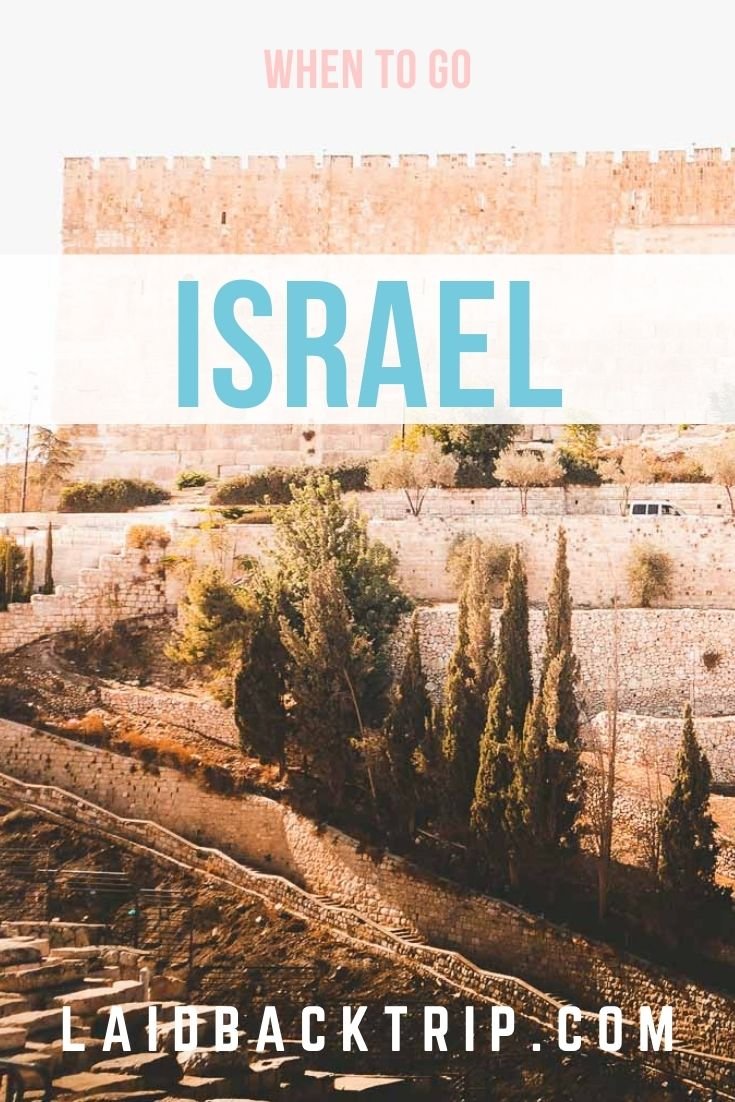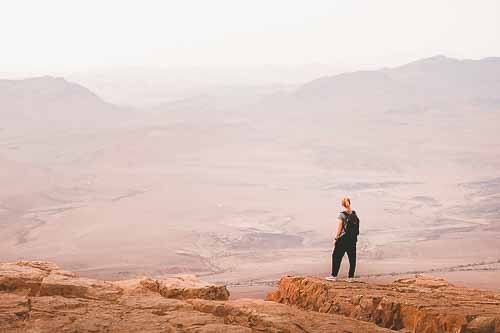When Is the Best Time to Visit Israel
When is the best time to visit Israel? It depends upon your budget and what you would like to experience during your visit to Holy Land. Read our travel guide to find out what each season offers in terms of weather, cost, and activities.
When you plan your trip and search for information on the best time to visit Israel, you must consider many aspects that can seriously affect the final outcome.
Although Israel is quite a small and compact country, it is not that easy to give you straightforward advice because of one simple reason.
The best time for visiting the Holy Land is not affected only by the weather and seasons itself, but also by culture, holidays, religion, Shabbat (it is hard to avoid this one), or most importantly, activities you plan on doing and places you plan on visiting.
Still, once you know what your trip will look like and you'll have a final version of your Israel itinerary, it is much easier to start looking for flight tickets for a specific time.
It is good to know that Israel is a perfect destination when it comes to traveling because it is a country travelers can visit year-round, and we do not think there's a time when it is best to avoid this region.
Sure, it depends on your preferences - you certainly do not want to arrive in the country, for example, during the biggest Jewish holidays, if you want to avoid crowds.
On the other hand, if you seek to explore a new culture or spiritual context, this might be the right time for you. As you can see, there's a lot to consider.
That's why we've put together this travel guide on the best time to travel to Israel, based on our recent experience.
The Best Travel Days
If you plan on visiting Israel, the whole planning process is not only about creating an itinerary and thinking of the best time to visit only in regards to considering the weather.
It is also essential to take into account how many days you'll spend in the country and what days it will be. You might be asking why.
First of all, it is necessary to know that traveling in Israel might be affected by holidays that are mostly connected with religion.
We will talk about the most common one - Shabbat (well, we know it is not a holiday, but opening hours remind it a lot) later on, but in general, when we planned our trip, our thoughts were as follows.
We wanted to spend two weeks in Israel, and it was clear we would enjoy all days in a week in the country.
Still, we wanted to make sure we'll have plans for Friday afternoons and Saturdays, plus we knew some places are also closed on Sundays or Mondays.
That's why you should make sure you know where your itinerary will take you on every particular day, especially if you travel around the country for a shorter amount of time.
If you have only five days, try to avoid the Shabbat (although some sights such as the Western Wall are magical during this time) because when short on time, it can considerably affect places you can see and visit.
In a nutshell, you should think about this topic when booking flight tickets.
Shabbat
When focusing on the best time to visit Israel, we cannot forget to look more closely at the Shabbat topic because this day can affect your travels quite a lot in both positive and negative ways.
If you have been already searching for information about Israel, it is more than likely that the word Shabbat appeared once or twice.
Shabbat happens every week, from Friday's sunset till Saturday's sunset, and during this time, in the Jewish parts of the country, it can seem that life stops.
It is a day that Jews spend with their families, celebrating and praying.
What does it mean for international visitors?
First of all, if you arrive during this time in the most orthodox parts of the country, such as Jerusalem, Safed, or Tiberias, you'll find almost all businesses, including top sights and restaurants, closed and public transport also does not work.
Unless you have a car, getting around Israel will be very difficult. It also means that you won't be able to get from or to Ben-Gurion Airport by public transport on this day.
As you can see, it is not very convenient. Therefore the best thing you can do is to be well prepared.
We experienced two Shabbats when in Israel.
During the first Shabbat, we spent our day in Tel Aviv (which has a very European-like vibe) on Friday night, then we took a tour on Saturday to West Bank.
The next week, we visited Nazareth, that has a strong Christian and Muslim community together with Beit Alfa Synagogue and Beit Shean.
It is good to know that you won't make a mistake if you visit one of Israel's national parks during Shabbat.
They usually close one hour earlier than during the rest of the week, but that's it.
Some famous sites that are not affected by Shabbat are, for example, Eilat, Sea of Galilee or Ein Bokek.
You can sunbathe and snorkel in the Coral Beach Nature Reserve in the morning and visit beautiful sites such as the Red Canyon or Timna Park in the afternoon (or vice versa).
Similarly, in Ein Bokek, you can swim in the Dead Sea in the morning, and hike in Ein Gedi Nature Reserve or explore Masada later on.
As you can see, there is no need to be afraid to travel in Israel during Shabbat; you only need to know where to go.
On the other hand, we believe there are travelers who want to experience the religious, almost mystical atmosphere in Israel during Shabbat, maybe even take a tour that offers to spend the Shabbat dinner with one of the local families or watch orthodox Jews praying at the Western Wall.
Hiking
The best time to travel to Israel can also be different if you plan on doing an exact type of activity.
When it comes to hiking, Israel is probably not the first destination that comes to your mind.
But it is good to know the country offers several interesting trails that combine wonderful nature and historical sights along the way.
One of them is the famous Israel Trail that connects the most attractive places in the country from north to south, but there are shorter but still multiple-day trails such as the Jesus Trail near the Sea of Galilee or many more day-hikes in national parks.
If you decide to explore Israel from this angle, arriving during spring or autumn pays off. It is not that hot, and precipitation is relatively low.
Remember that Israel Trail traverses the entire country, and hiking in the Sea of Galilee, Negev Desert, or near the Dead Sea area during the summer will be highly challenging.
Sightseeing
If there's one thing Israel is famous for from a tourist point of view, it is definitely the history and architecture.
Jerusalem's crown jewels, such as the Dome of the Rock, the Church of the Holy Sepulchre, or the Mount of Olives, are only a few sights in the sea.
There is so much more to see and do, and wonderful places such as Beit Shean, Caesarea, Bahai Gardens, or Knights' Halls (we could go on almost forever) should be on your bucket list as well.
So the question is - when to go to Israel for sightseeing?
In our opinion, if you plan on traveling around the country and seeing as much as possible, we would recommend you either month of March, April, June, or September, October, and November.
This way, you'll avoid the unbearable heat, and it will be much easier to focus on the beauty around you.
Religion
Israel, alias Holy Land, is a destination where many religions have their roots. Therefore, many travelers plan to visit here on holiday or other significant days to celebrate with other believers.
Again, although some visitors might be looking specifically for these celebrations, others would like to avoid them.
In a nutshell, holidays in Israel usually mean different opening hours, closed top attractions, or non-existent public transport, which can be a nightmare for a regular traveler.
We'll leave the decision on whether it is great or not to visit Israel during the holiday to you, but the most important days are these.
Christmas, especially in Bethlehem. But not just here but also in Nazareth, Jerusalem, or small sites such as Capernaum or Mount Tabor.
Easter - the date is moveable, so always check the date for Easter for the next year - it is usually at the end of March or the first half of April.
Then you should certainly be aware of traveling in Israel during their New Year called Rosh Hashanan (September) and the most celebrated holiday Yom Kippur (September or October).
Holidays also often affect hotel prices that can skyrocket.
Travel Insurance
We never leave home without travel insurance that was designed to cover our expenses if something goes wrong during the trip.
Travel insurance protects against theft, flight delays, injury, illness, cancellations, and much more.
World Nomads provides travel insurance for travelers to cover their trip essentials, including sports and adventure activities.
SafetyWing is affordable travel insurance for backpackers, long-term travelers, and digital nomads.
Travel smarter and safer!
When to Go
When is the best time to visit Israel often comes down to the weather, although we showed you there are more aspects to consider.
The country experiences four different seasons, and each of them has its pros and cons.
We visited Israel in November, and although it is often seen as an off-season month, we could not be happier.
In November, temperatures are a bit lower, but during the day, we still wore a short-sleeved t-shirt, which was very pleasant.
We will talk about this period more closely, but if you want a straightforward answer on the best time to visit Israel, in our opinion, you won't make a mistake if you opt for November.
Additionally, we also visited Jordan last year during the spring.
The Hashemite Kingdom of Jordan neighbors Israel in the east and has a relatively similar climate.
So we believe it's fair to say that the spring weather in Israel must be an excellent time to visit the country, as we had a blast in Jordan during this period.
Spring
If you plan to see as much as possible and your itinerary is already packed with plenty of stops, we are pretty sure that the spring months of March, April, and May will provide you with suitable conditions.
Days are still quite short, but they are getting longer closer to summer, it is getting warmer, and the whole country is in bloom.
For sure, you should not forget Passover celebrations that can affect your visit.
If you want to avoid crowds, tourism is also slowly waking up after long winter, and the number of travelers is still bearable.
In general, this time of the year is perfect for an active holiday, on the other hand, if your main goal is to lay on the beach and swim, the sea might still be a bit cold.
Summer
Although clear skies, almost no rain, and high temperatures might sound idyllic, it is necessary to think twice when considering visiting Israel in the summer.
Summer months are June, July, and August, and these are also some of the busiest months - not that the scorching weather would be perfect for exploring - because locals tend to flock to the beaches.
Two-thirds of Israel is covered by the desert, so no wonder temperatures can be high. So high that the visit can be uncomfortable for some travelers.
So if you decide to visit Israel during this time, make sure you are physically fit because hiking several hundred steps on the Snake Path Trail to Masada can be pretty exhausting.
On the other hand, summer might be a perfect time for those of you who want to enjoy relaxing on the shores of the Dead Sea, Red Sea, or the Mediterranean Sea.
Water will be pleasantly warm; only make sure you pack a lot of sunscreens. It is also great that days are long.
Autumn
We absolutely fell in love with Israel, and one of the reasons was that we saw the country during the fall, specifically November.
Autumn, when it comes to traveling, has several phases.
First of all, two months closer to summer, September and October, got recently become very popular because they mix together the good of both seasons.
Pleasant weather and thinner crowds. We could enjoy some sites such as Avdat National Park or Nimrod Fortress with far fewer tourists around.
By the way, make sure to get Israel Pass to save money on entrance fees.
On the other hand, it is necessary to think of the two most important Jewish holidays that do not have one fixed date, so they are celebrated every year at different times.
It can rain a bit more during the autumn, but it is nothing that should put you off.
The only downside about traveling closer to winter is shorter days and, therefore, different opening hours.
Sites in November usually closed at 4 PM, and sunset was around 5 PM, but we still managed to see plenty of sites.
Winter
December is an important time of the year for Christian pilgrims. But other than that, probably the least favorite time to visit Israel is during the winter months, December, January, and February.
First of all, temperatures are cooler, the chances of rain higher (especially in the coastal cities), and daylight get to its minimum.
On the other hand, prices are lower (not around Christmas Day and New Year's Eve, though), and you will have most of the top tourist attractions (even within Jerusalem), mostly to yourself.
Being able to visit famous places such as Beit Shearim or Tzipori National Park without crowds is always a huge advantage.
We would consider visiting Israel in the wintertime as a secret tip because the country has so much to offer, and if you do not mind that the sea will be colder, you may have just found a hotspot.
Moreover, accommodation will be cheaper, which is great for those who want to visit Israel on a budget.
Be prepared that visiting places prone to flash floods, such as Ein Avdat National Park or Red Canyon, can be dangerous.
So always make sure to check the weather forecast and local weather warnings before you go.
Don't forget that monitoring the weather forecast will help you to stay safe in Israel.
Travel Resources
Here you can find links to all the travel resources we use and which you might find helpful when planning your next holiday.
Accommodation: When looking for accommodation, we usually search hotels via Booking.com or Hostelworld.
Tours: Although we love to travel independently, some places are better to visit with a guided tour.
We prefer GetYourGuide for its easy-to-use interface and solid reputation. Another great alternative is Viator.
Rental Cars: When going on a road trip, we always use Rentalcars.com, a reliable site for booking a rental car in advance.
Flight Tickets: When looking for flight tickets, you can search Skyscanner to find the best price.
Travel Insurance: World Nomads and SafetyWing cover against risks of travel.










